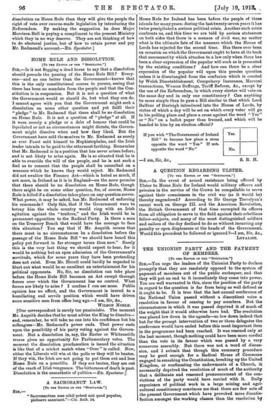HOMR RULE AND DISSOLUTION.
[TO THE EDITOR OF THE " SPECTATOR."]
SIR,—Is it not flogging a dead horse to say that a dissolution should precede the passing of the Home Rule Bill ? Every- one—and no one better than the Government—knows that this is the only constitutional course to pursue, seeing that there has been no mandate from the people and that the Con- stitution is in suspension. But it is not a question of what the Government would or should do, but what they can do. I cannot agree with you that the Government might seek a dissolution on some other question and yet fulfil their " pledge " to Mr. Redmond that there shall be no dissolution on Home Rule. It is not a question of " pledge" at all. If it were merely a pledge or a debt of honour that could be liquidated or not as circumstances might dictate, the Govern- ment might dissolve when and how they liked. But the Government have sold themselves to Mr. Redmond as surely as ever Faust sold himself to Mephistopheles, and the Irish leader intends to be paid to the uttermost farthing. Remember that Mr. Redmond is in a position that has never arisen before, and is not likely to arise again. He is so situated that he is able to override the will of the people, and he is not such a fool as to consent that the people shall be consulted on a measure which he knows they would reject. Mr. Redmond did not swallow the Finance Act—which is hated as much, if not more, in Ireland as it is in England—on the mere promise that there should be no dissolution on Home Rule, though there might be on some other question, for, of course, Home Rule is killed if a dissolution takes place on any question soever. What power, it may be asked, has Mr. Redmond of enforcing his commands ? Only this, that if the Government were to betray him the whole country would ring with an Irish agitation against the " traitors," and the Irish would be in permanent opposition to the Radical Party. Is there a man on the Treasury Bench that would have the courage to face this situation P You say that if Mr. Asquith means that there must in no circumstances be a dissolution before the passage of the Home Rule Bill " we should have heard this policy put forward in far stronger terms than now." Surely this is the very last thing we should expect to hear, for it would be nothing but an open admission of the Government's servitude, which for some years they have been pretending does not exist. Even Mr. Birrell could hardly be expected to blurt out what would be so excellent an entertainment for his political opponents. No, Sir, no dissolution can take place before the Home Rule Bill becomes an Act except through forces over which the Government has no control. What forces are likely to arise ? I confess I can see none. Public opinion has no effect, and the Government is inured to a humiliating and servile position which would have driven more sensitive men from office long ago.—I am, Sir, &c.,
WILSON NOBLE.
[Our correspondent is surely too pessimistic. The moment Mr. Asquith decides that he must advise the King to dissolve— and, remember, he will take no one into his confidence but his colleagues—Mr. Redmond's power ends. That power rests upon the possibility of his party voting against the Govern- ment. But a dissolution in, say, the Easter or Whitsuntide recess gives no opportunity for Parliamentary votes. The moment the dissolution proclamation is issued the situation is like that of a cricket match when " Over" is called. Now, either the Liberals will win at the polls or they will be beaten. If they win, the Irish are not going to put them out and lose Home Rule on a punctilio. If they are beaten, they are out of the reach of Irish vengeance. The bitterness of death is past. Dissolution is the anaesthetic of politics.—En. Spectator.]










































 Previous page
Previous page